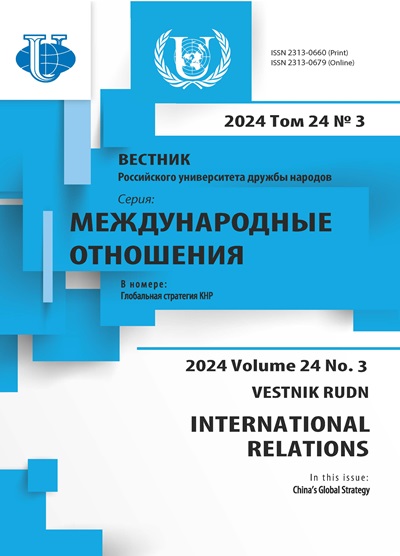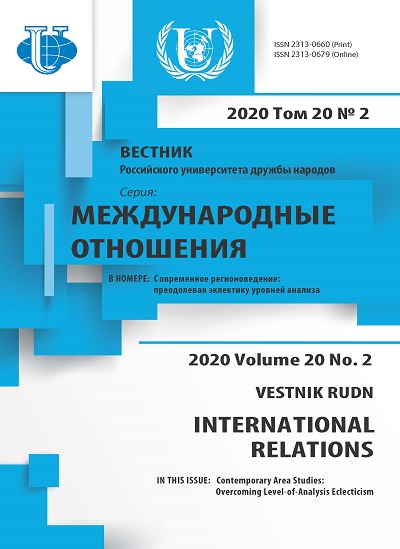Международные отношения в Африке, истории геноцида и эмансипации. Часть 2
- Авторы: Кэмпбелл Х.G.1
-
Учреждения:
- Сиракузский университет
- Выпуск: Том 20, № 2 (2020): Современное регионоведение: преодолевая эклектику уровней анализа
- Страницы: 367-381
- Раздел: МИР И БЕЗОПАСНОСТЬ
- URL: https://journals.rudn.ru/international-relations/article/view/23977
- DOI: https://doi.org/10.22363/2313-0660-2020-20-2-367-381
Цитировать
Полный текст
Аннотация
Умолчание проблемы геноцида в международных отношениях - это одна из форм отрицания геноцида, которая в будущем может привести к новым масштабным преступлениям. В статье утверждается, что в эпоху глобального милитаризированного апартеида перед прогрессивными учеными стоит задача критики и разоблачения прошлых и нынешних преступлений против человечности, которые происходят в Африке. Опираясь на альтернативный анализ в рамках Бандунгского проекта, в документе был проанализирован вклад идей, возникших в результате борьбы против апартеида и борьбы за репаративное правосудие. Борьба Глобального Юга достигла кульминации в процессе Всемирной конференции против расизма (WCAR), в результате чего антирасистская проблематика стала центральной в международных отношениях в Африке. Новая энергия, появившаяся в результате затяжной борьбы за хлеб, мир и справедливость, приняла форму перехода к Африканскому союзу, оставив позади концепцию невмешательства во внутренние дела государств. В статье анализируется усиление афропессимизма в контексте конструктивистских подходов в африканских международных отношениях. Вклад радикальных африканских феминисток представлен как новое направление, в котором происходит слияние прогрессивных антиимпериалистических интеллектуальных традиций с радикальными формами феминизмами. Эти две традиции открывают возможности для эмансипативного проекта. Данный проект приобрел особое значение в период хрупкости глобального капитала, когда неустойчивость капитализма угрожает новыми и бесконечными войнами и дестабилизацией в Африке. Современный гуманизм является оружием против этого, и именно в этом направлении ученые должны вести дискуссию о «несостоявшихся государствах» в Африке.
Об авторах
Хорас Кэмпбелл
Сиракузский университет
Автор, ответственный за переписку.
Email: hgcampbe@syr.edu
доктор философии, профессор политологии и афроамериканских исследований, Школа гражданства и публичной политики им. Дж. Максвелла
Сиракьюс, СШАСписок литературы
- Abendroth, M.G. (2005). Cuba’s National Literacy Campaign: A Mass Movement of Emancipatory Global Civic Education. PhD dissertation. University of St Thomas, Minnesota.
- Ake, C. (1982). Social Science as Imperialism: A Theory of Political Development. Ibadan: Ibadan University Press.
- Amadiume, I. (1987). Male Daughters, Female Husbands: Gender and Sex in African Society. London: Zed Books.
- Amadiume, I. (2000). Daughters of the Goddess, Daughters of Imperialism: African Women, Culture, Power and Democracy. London: Zed Books.
- Amin, S. (2004). The Liberal Virus: Permanent War and the Americanization of the World. New York: Monthly Review Press.
- Amin, S. (2019). The Long Revolution of the Global South: Toward a New Anti-Imperialist International. New York: Monthly Review Press.
- Amin, S. (2013). Audacity and More Audacity. Review of Radical Political Economics, 45 (03), 400-409. doi: 10.1177/0486613413482277
- Ayers, A. (2012). An Illusion of the Epoch: Critiquing the Ideology of “Failed States”. International Politics, 49 (05), 568-590. doi: 10.1057/ip.2012.16
- Bayart, J.F. (1993). The State in Africa: The Politics of the Belly. London: Longmans.
- Brautigam, D. (2009). The Dragon’s Gift: The Real Story of China in Africa. Oxford: Oxford University Press.
- Brooks, R. (2016). How Everything Became War and the Military Became Everything. Tales from the Pentagon. New York: Simon & Schuster.
- Campbell, H. (2008). The Ethics and the Enterprise of Studying Africa. African Studies Review, 51 (03), 149-155. doi: 10.1353/arw.0.0120
- Campbell, H.G. (2013). Global NATO and the Catastrophic Failure in Libya: Lessons for Africa in the Forging of African Unity. New York: Monthly Review Press.
- Campbell, H.G. (2020). The War on Terror as a Business: Lessons from Kenya and the Somalia Interventions. African Review, 47 (01), 1-40. doi: 10.1163/1821889X-12340014
- Clapham, C. (1996). Africa and the International System: The Politics of State Survival. Cambridge: Cambridge University Press. doi: 10.1017/CBO9780511549823
- Collier, P. & Hoefler, A. (2004). Greed and Grievance in Civil War. Oxford Economic Papers, 56 (04), 563-595. doi: 10.1093/oep/gpf064
- Crocker, C.A., Hampson, F.O. & Aall, P. (Eds.). (1996). Managing Global Chaos: Sources of and Responses to International Conflict. Washington: United States Institute of Peace.
- Daley, P. (2008). Gender and Genocide in Burundi: The Search for Spaces of Peace in the Great Lakes Region. London: James Currey.
- Daley, P. (2015). Researching Sexual Violence in the Eastern Democratic Republic of Congo: Methodologies, Ethics and the Production of Knowledge in an African Warscape. In: Coles, A., Gray, L. & Momsen, J. (Eds.). The Routledge Handbook of Gender and Development. London: Routledge. P. 429-440. doi: 10.4324/9780203383117
- De Waal, A. (1997). Famine Crimes: Politics and the Disaster Relief Industry. London: James Currey.
- Duffield, M. (2001). Global Governance and the New Wars: The Merging of Development and Security. London: Zed Books.
- Fanon, F. (1969). Towards the African Revolution. New York: Grove Press.
- French, H. (2014). China’s Second Continent: How a Million Migrants Are Building a New Empire in Africa. New York: Alfred A. Knopf.
- Harvey, D. (1990). The Condition of Postmodernity: An Enquiry into the Origins of Cultural Change. Oxford: Wiley-Blackwell.
- Harvey, D. (1996). Justice, Nature and the Geography. Oxford: Blackwell.
- Harvey, D. (2003). The New Imperialism. Oxford: Oxford University Press.
- Hudson, M. (2015). Finance as Warfare. London: College Publications.
- Jones, B.G. (2008). The Global Political Economy of Social Crisis: Towards a Critique of the ‘Failed State’ Ideology. Review of International Political Economy, 15 (02), 180-205. doi: 10.1080/09692290701869688
- Juma, C. (1989). The Gene Hunters: Biotechnology and the Scramble for Seeds. Princeton: Princeton University Press.
- Kaplan, R. (1994). The Coming Anarchy. Atlantic Monthly, 273 (02), 44-76.
- Mama, A. (1995). Feminism or Femocracy? State Feminism and Democratisation in Nigeria. Africa Development, 20 (01), 37-58.
- Mama, A. (2007). Is It Ethical to Study Africa? Preliminary Thoughts on Scholarship and Freedom. African Studies Review, 50 (01), 1-26. doi: 10.1353/arw.2005.0122
- Mama, A. (2011). What Does It Mean to Do Feminist Research in African Contexts? Feminist Review, 98 (01), 4-20. doi: 10.1057/fr.2011.22
- Maren, M. (1997). The Road to Hell. The Ravaging Effect of Foreign Aid and International Charity. New York: Free Press
- Mbaku, J.M. (2020). Good and Inclusive Governance is Imperative for Africa’s Future. In: Foresight Africa: Top Priorities for the Continent 2020 - 2030. Brookings Institution, January 8. URL: https://www.brookings.edu/ research/good-and-inclusive-governance-is-imperative-for-africas-future/ (accessed: 20.01.2020)
- Mbeng Mezui, C.A. & Duru, U. (2013). Holding Excess Foreign Reserves Versus Infrastructure Finance: What Should Africa Do? African Development Bank. Working Paper Series, 178. URL: https://www.afdb.org/ fileadmin/uploads/afdb/Documents/Publications/Working_Paper_178_-_Holding_Excess_Foreign_Reserves_ Versus_Infrastructure_Finance-_What_should_Africa_do.pdf (accessed: 20.01.2020)
- McClintock, A. (1995). Imperial Leather: Race Gender and Sexuality in the Colonial Context. New York: Routledge
- Mustapha, A.R. (2002). States, Predation and Violence: Reconceptualizing, Political Action and Political Community in Africa. Paper presented at 10th General Assembly of CODESRIA, Kampala, December
- Ndikumana, L. & Boyce, J.K. (2018). Capital Flight from Africa: Updated Methodology and New Estimates. Political Economy Research Institute (PERI). University of Massachusetts-Amherst. URL: https://www.peri.umass.edu/capital-flight-from-africa (accessed: 20.01.2020)
- Neocosmos, M. (2007). Development, Social Citizenship and Human Rights: Re-thinking the Political Core of an Emancipatory Project in Africa. Africa Development, 32 (04), 35-70. doi: 10.4314/ad.v32i4.57320
- Nkrumah, K. (2007). Africa Must Unite. London: Panaf Books.
- Piketty, T. (2014). Capital in the Twenty-First Century. Harvard: Harvard University Press.
- Reno, W. (1998). Warlord Politics and African States. Boulder: Lynne Reinner.
- Rodney, W. (1970). The Imperialist Partitioning of Africa. Monthly Review, 21 (11), 103-114.
- Rodney, W. (1990). Walter Rodney Speaks: The Making of an African Intellectual. Trenton, Africa World Press.
- Rodney, W. (2019). The Russian Revolution: A View from the Third World. New York: Verso Books.
- Spegele, R.D. (2014). Emancipatory International Relations: Critical Thinking in International Relations. London: Routledge. doi: 10.4324/9781315768007
- Steans, J. (1998). Gender and International Relations: An Introduction. Cambridge: Polity Press.
- Tandon, Y. (2015). Trade is War: The West’s War against the World. New York: OR Books.
- Wamba-dia-Wamba, E. (1993). Democracy, Multipartyism and Emancipative Politics in Africa: The Case of Zaire. Africa Development, 18 (04), 95-118.
- Zartman, W. (1998). Collapsed States: The Disintegration and Restoration of Legitimate Authority. Boulder: Lynne Reinner.
- Zeleza, P.T. (2006). The Troubled Encounter between Postcolonialism and African History. Journal of the Canadian Historical Association, 17 (02), 89-129. doi: 10.7202/016592ar











